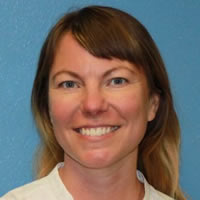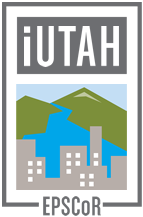News and Highlights
This is a list of past iUTAH EPSCoR news from 2012 to 2018.
October 20, 2015
Nibley's water future: City discusses how new well will impact water conservation
Check out the Herald Journal's follow-up article on iUTAH researcher Dr. Doug Jackson-Smith's presentation of the 2014 iUTAH household survey on Utah’s water future findings to the Nibley City Council.
October 8, 2015
iUTAH Post-doctoral Spotlight: Dr. Rachel Gabor, RFA1/2

Rachel started out as an analytical chemist with a focus on nanofabrication and nanoparticles (Harvey Mudd College, BS, University of Minnesota, MS). She then spent several months doing Hurricane Katrina recovery in New Orleans and saw first hand how human alterations to the landscape impact our water systems and the ecosystem services they provide. Inspired to study watersheds, she went to the University of Colorado Boulder (MS, Water Resources Engineering, PhD, Environmental Studies) where she worked with the Boulder Creek CZO studying organic matter in soils and streams.
Rachel is excited about the interdisciplinary nature of the iUTAH project, and particularly the chance to study watersheds in an urban system. In the six months she’s been with iUTAH, she participated in several sampling campaigns along Red Butte Creek and the Logan River with a focus on how to use biogeochemical tracers to understand the connections between the landscape and the stream.
October 1, 2015
iUTAH Post-doctoral Spotlight: Dr. Krishna Khatri, RFA3

Krishna Khatri is a Post-doctoral Research Fellow with iUTAH working with Courtenay Strong in the Department of Atmospheric Sciences at the University of Utah. Krishna received his PhD in Water Resources Engineering (in the area of risk and uncertainty analysis) from Delft Technical University, Netherlands; MSc in Integrated Urban Water Engineering from UNESCO-IHE, Netherlands; MPA in development study and BE in Civil Engineering from Tribhuvan University, Nepal. He has more than 10 years of experience working with governmental organizations, consultancies, and higher education institutions in Nepal, UK, Netherlands, and USA. Prior to coming to the University of Utah, he worked as a Senior Research Fellow at the University of South Florida. He was also an Honorary Research Associate (Sept 2007 to April 2011) in the Department of Civil Engineering at the University of Birmingham, UK. His main areas of expertise and interests include developing sustainable water resources and urban infrastructure system; risk and uncertainty analysis; and application of soft computing techniques for system modeling; and decision making under risk and uncertainty.
Krishna’s key role in iUTAH RFA-3 will be developing innovative frameworks, new methodology, and system models for application in Utah. The main objective is to analyze the important interactions and interdependences within and among natural, built, and social systems, in order to enhance the resilience and sustainability of water resources and water infrastructure in Utah.
September 24, 2015
iUTAH Post-doctoral Spotlight: Dr. Melissa Haeffner, RFA2

Melissa is interested in how cities grow in the desert. She explores this question by examining how the climatological, hydrological and socio-political contexts in which we live shape how we are able to manage water resources. She employs a variety of social science methods depending on the project including: surveys, interviews, stakeholder focus groups, scenario planning, mental mapping and visual sociology. Pursuing her research goals requires the ability and willingness to transcend disciplines, which is why Melissa seeks out opportunities to work with engineers, geographers, atmospheric scientists, and others. To that end she has pursued degrees in Sociology (DePaul University, BA/MA), Urban Planning (Massachusetts Institute of Technology, MS) and Ecology (Colorado State University, PhD). She is excited to use her experience to innovate interdisciplinary research pursuits with iUTAH affiliates and work with community decision-makers to plan for environmental and social sustainability in the Wasatch Front.
September 17, 2015
iUTAH Post-doctoral Spotlight: Dr. Erik Oerter, RFA1

Erik comes to iUTAH from the University of California - Berkeley, where he studied how carbon, oxygen, and uranium isotopes in soils respond to climate for his PhD research. Part of this research was centered on how water behaves in soils, and that is his main focus here in Utah. Erik is using isotope-enabled soil water hydrology to better understand water in soils along the Wasatch Front, and how soil water contributes to streamflow and atmospheric water vapor.
August 26, 2015
EPSCoR Director Visits with iUTAH
The director of NSF EPSCoR, Dr. Denise Barnes, took time before attending the iUTAH External Advisory Board Meeting and Summer Symposium in Midway to familiarize herself with the iUTAH project.
Dr. Barnes spent the better part of Wednesday, July 15, in informal interactions with a range of iUTAH participants. After meeting with Education, Outreach and Diversity Coordinator Ellen Eiriksson and Assistant Director and Project Administrator Andy Leidolf at iUTAH’s satellite office on the University of Utah campus, Dr. Barnes had lunch with iUTAH undergraduate and graduate students and postdocs to learn about iUTAH’s efforts in building the next generation of our state’s STEM workforce.
In the afternoon, she was treated to a comprehensive tour of Red Butte Creek organized by iUTAH facilities lead Jim Ehleringer and researchers Paul Brooks and Rachel Gabor. At four different stops along a route covering the length of the mountain-to-urban transition and ending in the heart of the Red Butte Research Natural Area, 13 iUTAH researchers, the majority of them students, shared their work on how social and urban landscape processes are connected to changes in biogeochemistry, hydrology, and microbiology; the integration of social and biophysical neighborhood typologies that influence hydrology and biogeochemistry; and the coupling of slope and riparian landscapes to better understand the biogeochemistry and ecohydrology of montane systems.
In addition, Jim Ehleringer provided perspectives on the future of iUTAH vis-à-vis planned urban and montane NEON sites. Dr. Barnes appreciated the effort put forth by iUTAH in hosting her for this visit, calling it “informative, productive, and very enjoyable.”

Doug Jackson-Smith, Allison Chan, Paul Brooks, Samantha Weintraub, Billy Brazelton, Denise Barnes, Rachel Gabor, Margaret Wolf, Philip Stoker, Mallory Millington, Alexei Perelet, and Dave Eiriksson


